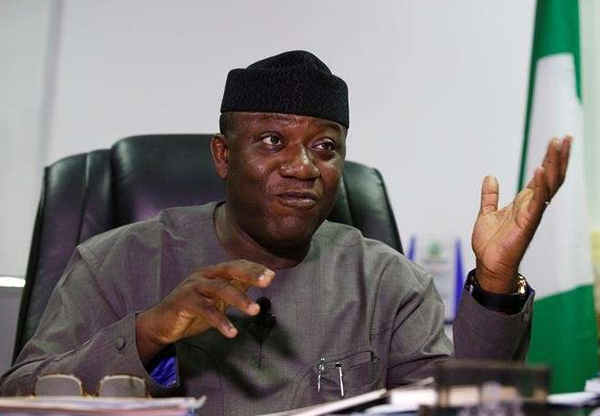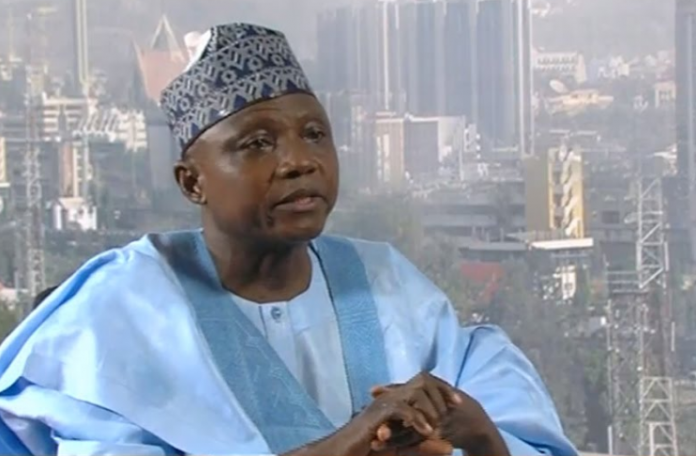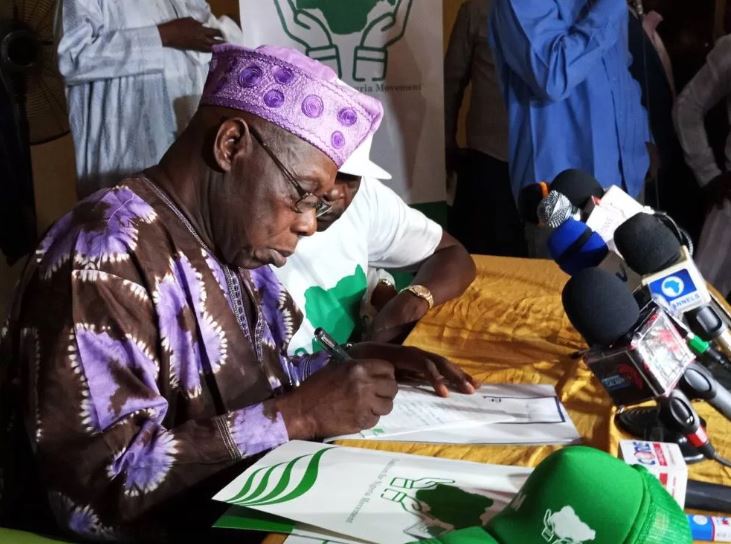I must confess. Getting engaged in the public discourse of Ekiti State politics doesn’t come naturally. It’s really not in the top bracket of issues of national importance that I look forward to intervene in. But my intervention has almost always been due to some knee-jerk reaction. This reaction comes either when Fayose do or say something that demeans human decency that makes me to wonder if some people in some remote corners of the world are not giggling and wondering if Nigerians are truly a civilized people, or when someone, in an attempt to lend his voice on what can now aptly be described as the “Fayemi Question” in Ekiti politics makes a fool of himself with comments so illogical and odious to my senses.
But the inspiration for this piece came from a slightly different direction. It was inspired by two interrelated sources. The first was from a brilliant piece by an unknown author that made the rounds recently on social media which was entitled “Who is afraid of Fayemi?” This unnamed author had expressed his dismay that more than 30 of the governorship aspirants in the All Progressives Congress (APC) and their supporters are yet to talk about what they and their principals have in store for Ekiti state if given the party ticket. Yet, they would rather speak derisively about a man who hasn’t even expressed his intention either publicly or privately to join the governorship slugfest. The piece also admonished the aspirants and their supporters to concentrate on the state’s ruling party and Ayo Fayose, a governor who has, for all practical purposes, turned the state into a wasteland. Speaking of wasteland, a story appeared in The Nation newspaper on Friday, January 26, 2018 with the headline “APC tackles Fayose for allowing liquidation of Gossy Water.”
In the report, the All Progressives Congress (APC) in the state had “blamed the governor (Fayose) for allegedly creating an unfriendly atmosphere for businesses, regretting that instead of building on [the] initiatives of his predecessors to sustain job-creating businesses,” Fayose have “created conditions that hampered businesses with attendant job losses.” The report added that the “board of Warm Spring Waters Limited had given liquidation notice to stakeholders, citing failure of the company to pay its debts and other challenges, one of which was lack of electricity supply for three years, including the non-patronage of the company’s product by Fayose’s administration because the company was the initiative of (Fayemi) his predecessor.”
I felt bad about this report not only because of the imminent death of a company and its resultant effect on workers who would no longer have incomes to sustain themselves and their families, but also the mention that Ikogosi Warm Spring itself (which is the company’s water source) is now diseased, no thanks to Fayose’s penchant for killing all things that ennobles civilization. The Ikogosi Warm Spring was one of the places I visited for the first time at the tail-end of the Fayemi administration. I could not believe how he had transformed this place into a world-class tourist resort. Being a lover of nature, I was immediately attracted to this resort because of its serenity, its air quality and its regal appearance. I immediately concluded that it was a perfect place to escape from the Lagos ‘madness’ on occasions. About a year after Fayemi left office, I drove by the resort to spend just a few hours before proceeding to Ado-Ekiti. It was then I knew that the place was on a nosedive because the gate-keeper at the first entrance was nowhere to be found for close to half hour of waiting. And I left in disgust. One can only imagine how Fayemi himself would feel now with all the reports about how his works are deliberately being dismantled by his successor right before his eyes to the eternal detriment of the state and its people.
Advertisement
There’s hardly any point in lamenting anymore about what Ekiti has become under Fayose. The present governor is a classic embodiment of that time-tested truism that you cannot give what you do not have. Fayose also personifies another age-long adage that no matter how a pig is expensively dressed, it will always find its way into the mud to revel and scavenge because the mud is its natural habitat. Perhaps, the history of Fayose’s emergence on the political scene of a state that prides itself as having the highest academically credentialed number of people per capita and the subjection, if not resignation of this very same people to the most inhumane treatments by their governor should be left to sociologists and political scientists worth their onions to unravel.
But what about John Kayode Fayemi?
Perhaps there’s no one that has affected the politics of Ekiti state in profound ways (in a relatively short period of time) with the intensity and curiosity he generates since the state’s creation than Dr. Kayode Fayemi. It’s for this reason that, at intervals, one must interrogate what may have been responsible for a public personality with no history of political brigandage behind him or known to having any earth-shaking oratory prowess to have become an issue that has now transmuted into the “Fayemi Question.” What is it that unsettles some people about this man that even Fayose—-with his self-acclaimed fearlessness—-had to resort to constitutional illegality just to keep him away from the state’s political landscape? Why are people intuitively disoriented that there’s a “Fayemi Question” yet, doesn’t seem to know exactly what the “Question” really is, let alone having an answer? For someone who could have walked the length and breadth of Ekiti State without anyone noticing less than a decade ago to now become a compelling issue in Ekiti politics should also be a subject of curiosity for sociologists and political scientists. It is perhaps against this backdrop that the “Fayemi Question” in Ekiti state politics should be interrogated with a view, once again, to attempt to decode the man and his essence.
Advertisement
Man has been sufficiently documented as having a mortal fear for what he doesn’t understand. Chief Obafemi Awolowo was sufficiently misunderstood at the initial stage of his political life by a significant segment of people in close proximity (his own people) with him. One then wonders if Fayemi may not be following the same trajectory as the late sage at least at the earliest state of his political life. Like Awolowo who ‘unseated’ his people from their comfort zone of reckless superstition and ignorance into modernity within a relatively short spate of time when they were hardly ready, the novelties and intellectual approach that Fayemi brought into governance when he ruled the roost in Ekiti that the people may not have prepared for (at least not so soon) may have contributed—-in the main—-to his being misunderstood.
Like Awolowo, Fayemi probably has in his DNA a fundamental principle that society must be constructed along those values and principles that defines them even when they’re hardly ready or when they may have lost or when they’re yet to come to any appreciable understanding of those values and principles. In other words, he shares this innate belief with the late sage that a leader may not reflect the people he leads. That he must be—-in the main—-a discernible notch above their base and primordial instincts.
This belief must have triggered the social reconstruction or engineering—-which has been loosely defined as the art of using centralized planning, through giving the people the power to order their own priorities in an attempt to manage social change and regulate the future development and behaviour of a society—-they both presided over in their geographical enclaves. To have uprooted some of the dominant paradigms that had become second nature to some members of society with new building blocks as seen in the novelties in the nooks and crannies of the state during Fayemi’s time could be unsettling.
Let’s take education as a case in point. It was documented that while his people rejoiced that Awolowo came up with a comprehensive plan to educate their wards, a significant number of people also frowned at the idea because there would be a reduction of hands to help till the land in their households. Even out of his people that liked his brilliant idea, some still kicked and screamed against the levy/tax he introduced to fund their wards’ education. Fayemi also brought unprecedented reforms to the state’s education system. The children were given laptop computers as part of their educational tools for learning. Teachers who taught English, Math and science-based subjects or posted into very remote and rural corners of the state were given extra remunerations. But he committed sacrilege the moment he also made it known that there would be periodic exams for teachers not only to further enhance the quality of education in the state, but also for their personal/professional improvement. What’s more, the small-time thievery in which they engaged in to augment their salaries would no longer be tolerated. They kicked because they wanted to continue to eat their cake and have it.
Advertisement
So, the question then becomes, why did teachers in a state known for its seemingly undying love for knowledge acquisition find it very difficult, if not extremely painful, to embrace a holistic reform of a product that made the state and its people the cynosure of all eyes not only in the country but the international community because they must maintain fidelity to their personal interests even if society as a whole must suffer? As part of the educated elite, why was it problematic for them to understand that a society can never grow if individuals struggle to realize their interests at the expense of the society, but rather that individual interests are more easily achievable within the society or the group interest? It doesn’t get any more ironical than this.
The aforementioned even throws up another curiosity as to whether they could be rebelling against something. One may want to ask why a group would be antagonistic of the very thing that would have enhanced the quality of their profession, not to talk of their population. Granted they could not see the contradiction inherent in their struggle against someone who wanted nothing but to elevate them from the lethargy in which they’ve been mired for so long, it’s even perplexing that they did not see anything wrong in embracing someone who is a complete anti-thesis of what had defined them as a people and a professional class.
Could it have been safe to say that their embrace of this opposite pole personality was the beginning of the subversion of intellectualism of which they’re also integral that Fayemi not only typifies, but also introduced into the governance structure of the state? Could they have started—-at least unintentionally—-their own variant of anti-intellectualism movement that first reared its ugly head in Europe in the twentieth century, which is now being spearheaded by Fayose in the way he expresses Isaac Asimov’s dictum that “my ignorance is just as good as your knowledge” which is the new model of governance in Ekiti? If it is indeed the case, does Fayemi then represent the repudiation of intellectualism they seem not to have any more use for? Is there a disconnect—-if not a wide gulf—-between Fayemi’s intellectual predilection and the default setting of his moral and leadership compass vis-à-vis where his people truly would like to be that affects how they both see development? It should be noted that a society that struggles for whatever reason with its intellectuals is doomed. And Ekiti may steadily be sleep-walking after being heavily hypnotised or sedated by Fayose into this perdition unless someone made of sterner stuff comes into its rescue.
Perhaps the “Fayemi Question” even when it is yet to be adequately contextualized, if not properly articulated can be found partly in the personal disposition of the man as a public figure. Fayemi’s intellectual persona, as much as this is more of what the state needs at this point in its history, can also be counter-productive because of its inability to accommodate the base instincts of a significant section of his people, therefore affecting how they see him as their leader. Truth be told, you can be in very close proximity with Fayemi, yet makes you feel as if he’s very distant from you due to the aloofness he exudes when you think it’s hardly necessary. He can extend his warm cordiality to you one day, but please don’t bet on the same warmth the next time because he could be staring at you as if he was seeing you for the first time. Although this trait is not uncommon to someone who’s naturally shy, an introvert and an intellectual to boot. But it can make you feel unwanted in his midst. People with this trait are sometimes lost in their own world. But the warmth you long for in Fayemi can easily be derived, and in abundance by his wife Erelu Bisi Adeleye-Fayemi. Her interpersonal relationship is superb. They complement each other perfectly well.
Advertisement
In an attempt to find meaning to what I instinctively knew was a sham before the Sergeant Kolis and Tope Alukos came out to confess their misdeeds after my observation of the poll, I rode around Ado-Ekiti in taxis and embedded myself in drinking joints in the aftermath of the 2014 Ekiti governorship election just to find out find out how the people felt about the election. Much of what they said vacillated between the mundane and the ridiculous. While most of them could not dispute Fayemi’s performance (which has now become a reference point about how a society should be governed), some shrugged off his carefully orchestrated loss just because they believed he was too distant from them. A taxi driver said he shook hands with Fayose in his first coming and he was looking forward to the same experience. Another driver said he only saw Fayemi on TV as he was always in a vehicle with dark windows.
Perhaps the most perplexing of all the responses was from a Fayemi aide who admitted in a private conversation that he was not too keen about the re-election of his boss because he failed to show up at his mothers’ burial celebration. In a state that is far behind most states, not to talk of its southwest siblings in just about all the indices of human development, it beggars belief that people would put significant premiums on such mundane and intangible things. One could not but wonder how a sufficiently educated aide working for such a serious mind as Fayemi could not have figured out over the years with him that his principal was not cut out for his kind of social event. But that he would rather be more comfortable in a gathering of people discussing, perhaps, Dostoyevsky’s “The Brothers Karamazov,” Dante’s “Inferno” or the “Gulf of Tonkin Resolution.”
Advertisement
Chief Awolowo’s greatness was not by any accident of history, neither was his works that provided the greatest good for the greatest number made possible by his appearances at sundry public functions. Perhaps he was also accused of not being accessible enough, which may have prompted him to have deadpanned in one of his seminal books that “While many men in power and public office are busy carousing in the midst of women of easy virtue and men of low morals, I, as a few others like me, am busy at my desk thinking about the problems of Nigeria and proffering solutions to them.” This is, perhaps, also Fayemi’s undergirding principle to public office. Just like Awolowo, Fayemi may also be facing the unintended consequences of being misunderstood by his people until when history would be ready to give its unequivocal verdict about him. But it must be said that if your purpose for identifying with a leader is to serve your base instinct, it goes without saying that you should be afraid of Fayemi as your leader. You should, indeed, be very afraid.
Advertisement
Add a comment







